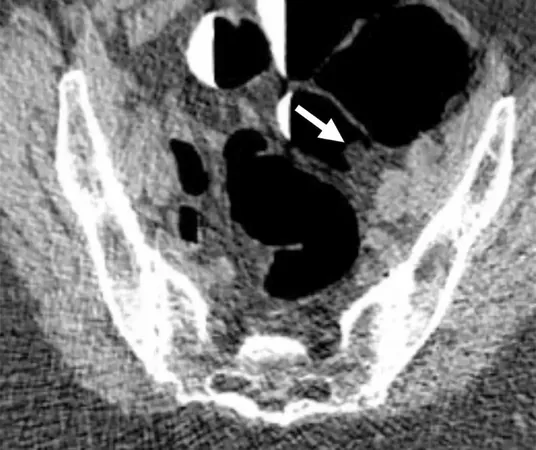
20 Years of CT Colonography: Revolutionizing Colorectal Cancer Screening!
2025-07-29
Author: Siti
A Breakthrough in Colon Cancer Detection
New research has unveiled the transformative impact of computed tomography colonography (CTC) on colorectal cancer (CRC) screening over two decades. This groundbreaking study spotlights the impressive correlation between CTC findings and subsequent optical colonoscopy (OC) results in the critical detection of larger polyps.
Massive Data Analysis
Published in the American Journal of Roentgenology, the research analyzed data from 15,341 CTC exams conducted on 11,830 patients, with an average age of 56. Notably, 9,168 of these patients underwent CTC for primary, asymptomatic CRC screening.
Astounding Findings
For those screened asymptomatically, the results showed a striking 15.9% rate of positive findings for polyps greater than 6 mm. Out of 1,683 cases detected by CTC, a remarkable 1,541 also revealed concordant lesions during OC, leading to a staggering positive predictive value (PPV) of 91.6%.
A Safe and Non-Invasive Solution
CTC emerged not just as an effective tool; it also proved to be a safe screening method. The study reported no major complications or cases of colonic perforation. Additionally, CTC detected significant extraneous conditions, such as advanced adenomas (4%), rare extracolonic malignancies (0.4%), and abdominal aortic aneurysms (0.3%).
Unprecedented Predictive Accuracy
The findings underscore CTC's impressive predictive accuracy: it showcased a PPV of 94.1% for sessile polyps and 95.7% for pedunculated polyps, solidifying its status as a powerful diagnostic alternative to traditional OC.
CTC: A Valuable Yet Underrated Tool
Despite its efficacy, the utilization of CTC has taken a sharp downturn, dropping from 1,589 exams in 2005 to just 72 in 2023 at the study's facility. However, the authors advocate for its continued relevance, especially with recent expansions in Medicare coverage for CTC screening.
The Future of CRC Screening
Study lead Dr. Perry J. Pickhardt from the University of Wisconsin emphasizes that CTC could bridge the gap in CRC prevention that current stool-based tests fail to address. By employing proper techniques, CTC not only reduces the risks associated with invasiveness but also provides the unique advantage of evaluating additional health concerns.
Concluding Thoughts on CTC's Role
While acknowledging limitations such as missed colorectal lesions and variability among radiologists, this pivotal research advocates for CTC as a crucial player in the ongoing fight against colorectal cancer, making it an essential consideration for both patients and healthcare providers.



 Brasil (PT)
Brasil (PT)
 Canada (EN)
Canada (EN)
 Chile (ES)
Chile (ES)
 Česko (CS)
Česko (CS)
 대한민국 (KO)
대한민국 (KO)
 España (ES)
España (ES)
 France (FR)
France (FR)
 Hong Kong (EN)
Hong Kong (EN)
 Italia (IT)
Italia (IT)
 日本 (JA)
日本 (JA)
 Magyarország (HU)
Magyarország (HU)
 Norge (NO)
Norge (NO)
 Polska (PL)
Polska (PL)
 Schweiz (DE)
Schweiz (DE)
 Singapore (EN)
Singapore (EN)
 Sverige (SV)
Sverige (SV)
 Suomi (FI)
Suomi (FI)
 Türkiye (TR)
Türkiye (TR)
 الإمارات العربية المتحدة (AR)
الإمارات العربية المتحدة (AR)